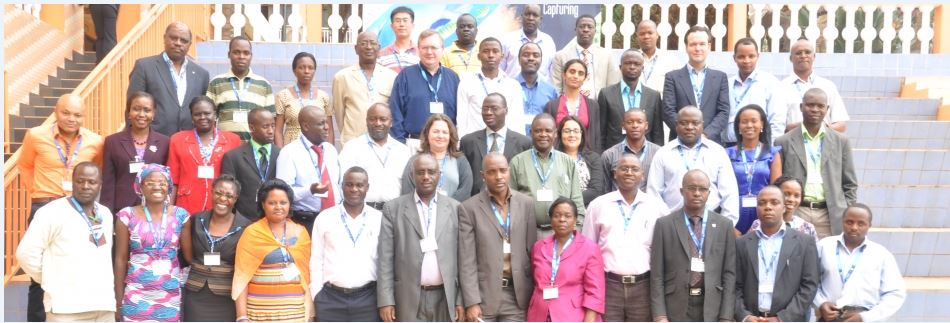- TEEB
- TEEBAgriFood
- Natural Capital Accounting
- TEEB Country Studies
- TEEB Water & Wetlands
- Other publications
- TEEB Case Studies (2009-2013)
- TEEB: Challenges and Responses (2014)
- Natural Capital Accounting and Water Quality: Commitments, Benefits, Needs and Progress – A Briefing Note (2013)
- TEEB Valuation Database Manual (2013)
- Nature and its Role in the Transition to a Green Economy (2012)
- Implementation Guide for Aichi Target 2: A TEEB Perspective (2012)
- Implementation Guide for Aichi Target 3: A TEEB Perspective (2012)
- Implementation Guide for Aichi Target 11: A TEEB Perspective (2012)
- Why Value the Oceans? A Discussion Paper (2012)
- TEEB Manual for Cities: Ecosystem Services in Urban Management (2011)
- TEEB for Business – Executive Summary 2010
- TEEB Climate Issues Update (2009)
- TEEB Interim Report (2008)

Geneva, 02 December 2013
The workshop provided a needed platform for the participants to reflect on how they could apply what had been learned and more importantly the need to report back and identify key allies in order to ensure a shift in how wetlands are currently valued.
Inspite of the high value of the ecosystem services that wetlands provide to humankind such as regulating the quantity and quality of water, they continue to be degraded at an alarming rate. This is because in most cases policies and decisions do not take into account the full value of wetlands and recognize their value in meeting development and conservation needs.
The second TEEB for Water and Wetlands training workshop on “Mainstreaming the values of water and wetlands into decision-making” brought together 50 participants from across Africa to share knowledge and receive guidance on different valuation techniques and strategies in order to convince decision-makers of the value of wetlands.
The training was held from 25th to 27th November 2013, in Kampala, Uganda, and was designed to provide participants with a better understanding of the concepts and methodologies behind recognizing, demonstrating and assessing the importance of water and wetlands, using qualitative, quantitative and when appropriate monetary indicators.
Honorable Flavia M. Nabugere, Minister of State Environment, The Republic of Uganda, in her closing remarks noted that “sadly the pressure and threats on wetlands from encroachment and conversion to agriculture, development and other uses greatly affects the integrity of this fragile ecosystem, which plays the invaluable function of storing and supplying water.”
The Honorable Minister further stated that it was vital to ensure that valuation is part and parcel of decision-making and informed participants that her Ministry had earmarked funds to conduct a national valuation exercise to determine the contribution of water and other natural resources including wetlands into national development.
The training workshop drew from the main findings and recommendations of the TEEB for Water and Wetlands Report published on 1st February 2013. The report builds on the TEEB approach to generate a better understanding of the ecosystem service values of water and wetlands, in order to encourage improved decision-making and business commitment for their conservation, investment and wise use.
The 3 day Workshop was organized by the UNESCO–IHE, Institute for Water and Education, Ramsar Centre for East Africa (RAMCEA), UNEP-TEEB Office, in close collaboration with partners from the International Union for Nature Conservation (IUCN) Netherlands Committee and the Institute for European Environmental Policy (IEEP). The funding for the workshop was provided thanks to the generous support of the Government of Norway, DGIS Netherlands, the Nile Basin Capacity Building Network and Cap-Net.
The workshop provided a needed platform for the participants to reflect on how they could apply what had been learned and more importantly the need to report back and identify key allies in order to ensure a shift in how wetlands are currently valued.
This workshop is the second training organized to disseminate the key recommendations from the TEEB for Water and Wetlands report after a similar training organized for Asia on 31st August 2013, in Bali, Indonesia during the 6th Annual International Ecosystem Services Partnership. The development of the training was informed by a training needs assessment survey distributed during the Kigali Forum for Wetlands.
The core of the training was structured under three main modules tailored to meet the specific learning objectives, namely:
- Module 1: on TEEB and its role in water and wetlands which provided an overview of the origins and objectives of the TEEB initiative since its launch in 2007, and highlighted two recent products of particular relevance, the “TEEB for Water and Wetlands” report (February 2013) and the “Guidance Manual for TEEB Country Studies” (May 2013);
- Module 2: on improving measurement and assessment for better governance and wise use which sought to explain the importance of measuring the benefits provided by water and wetlands, present the key indicators to do so, and explain the uses, advantages and limitations of monetary valuation towards these purposes; and
- Module 3: on integrating the value of water and wetlands into decision-making which presented the most important policy tools toward the wise use of wetlands, their respective advantages and disadvantages.
Some of the key outcomes of the training include:
- Increased knowledge and awareness on TEEB as a tool for decision making and consensus building on water and wetlands management
- Partnerships between different states and a pool of potential Trainers of Trainers for capacity building on the use of TEEB
- Appreciation by practitioners of economics as a tool for conservation
